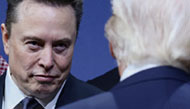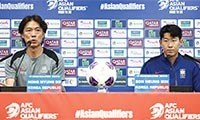Rock Star Not Afraid to Confront Kremlin
▶ YURI SHEVCHUK
ST. PETERSBURG, Russia - Reverence for Russia’s leaders, be they czars, general secretaries or presidents, has never come easily to Yuri Shevchuk. A bespectacled, slightly graying rock star, Mr. Shevchuk has spent much of the last three decades growling into a microphone in an effort, he says, to awaken in his compatriots a passion to break from their long history of bowing to heavy-handed authority.
These days, at 53, Mr. Shevchuk remains a guttural voice of defiance, just as he was when he began dodging Soviet censors by holding secret concerts in apartments throughout Russia in the early 1980s. But now he denounces Vladimir V. Putin’s government in his packed shows and openly scorns other musicians he accuses of selling out.
In June, he put his preaching into practice, stunning Russians by making an impromptu speech against official abuses during a meeting with Mr. Putin . He denounced abuse of power, restrictions on free speech and the “rich dukes with their privileges.”
“The only way
forward is making
everyone equal
before the law.”
“The only way forward is making everyone equal before the law,” he said. Mr. Putin snapped back, defending the police, but also the people’s right to demonstrate against the government. The confrontation was shown on government- controlled television, and the video put on Mr. Putin’s Web site .
In his St. Petersburg recording studio , Mr. Shevchuk spoke of a 1,000-year-old split between Russia’s elite and everyone else. Mr. Putin, Russia’s paramount leader, and the country’s president, Dmitri A. Medvedev, are just the latest incarnation of the aloof and disconnected authority that has stymied Russian society , Mr. Shevchuk said.
Mr. Shevchuk was first drawn to rock music as a way to escape the morass of 1970s Soviet Russia, the Brezhnev era of stagnation. “The sound of the electric guitar with fuzz freed our generation from this darkness and slavery,” he said. “We sought out the Beatles, Rolling Stones, Jethro Tull, Led Zeppelin and Van Morrison, and we were thankful for every song because it was fresh.
It was the energy of modern times.” In 1980, he founded DDT, a band that ultimately became a mainstay of the perestroika-era rock scene in St. Petersburg, though it did not play its first public concert until 1987, when Mikhail S. Gorbachev began easing the stultifying restrictions of Soviet rule.
With new freedoms, Russians got economic collapse, rampant corruption and criminality, two wars in the separatist southern region of Chechnya, and a string of deadly terrorist attacks born of those conflicts. The chaos led to the rise of Mr. Putin . Mr. Shevchuk and other musicians describe a kind of soft censorship on performers that accompanied Mr. Putin’s rise to power and has continued under President Medvedev.
Mr. Shevchuk says his refusal to conform has cost him. Though he retains a fairly large fan base, his concerts are rarely televised. He has accused radio stations of censoring his songs - a recent tune that includes the line “When the oil runs out, our president will die” is rarely played. Whatever Mr. Shevchuk’s popularity, Mr. Putin is Russia’s biggest celebrity, and no amount of criticism has eroded his support.
Mr. Shevchuk acknowledged that his influence eroded since the perestroika days. His latest project will capture some of this frustration. “The working title is ‘Before the Flood,’ ” he said. “But now I am thinking of a new name: ‘Tomorrow Will Be Different.’ They are both the same, but in the second name there is more hope.”
스마터리빙
more [ 건강]
[ 건강]이제 혈관 건강도 챙기자!
[현대해운]우리 눈에 보이지 않기 때문에 혈관 건강을 챙기는 것은 결코 쉽지 않은데요. 여러분은 혈관 건강을 유지하기 위해 어떤 노력을 하시나요?
 [ 건강]
[ 건강]내 몸이 건강해지는 과일궁합
 [ 라이프]
[ 라이프]벌레야 물럿거라! 천연 해충제 만들기
 [ 건강]
[ 건강]혈압 낮추는데 좋은 식품
[현대해운]혈관 건강은 주로 노화가 진행되면서 지켜야 할 문제라고 인식되어 왔습니다. 최근 생활 패턴과 식생활의 변화로 혈관의 노화 진행이 빨라지고
사람·사람들
more
“취미생활로 다진 친목… 선후배들과 만든 모교사랑”
사진러브한인 사진 동호회 사진러브(회장 크리스 고)는 13일 용수산에서 송년모임을 갖고 한 해를 마무리하는 뜻깊은 시간을 가졌다. 이날 모임에…

[홀인원] 이상원 박사
일반외과 전문의 이상원(왼쪽) 박사가 지난 9일 뉴포트비치 소재 골프장 9번 홀(152야드)에서 레스큐 클럽으로 친 샷이 그대로 홀에 빨려 들…
[송년행사 게시판] 재미시인협회
재미시인협회(회장 지성심)는 오는 20일 오후 4시 가든스윗호텔에서 한 해를 마무리하며 동인지 ‘외지’ 제35집 출판 기념회와 ‘제23회 재미…
[송년행사 게시판] 향군단체 연합
6.25 참전유공자회와 대한민국 육군협회 등 남가주 지역 향군 단체 연합은 19일 오전 11시30분, 용궁에서 송년 행사를 개최한다. 드레스코…
[송년행사 화보] “이웃과 함께 나누고 지인과 함…
KYCC13일 윌튼 플레이스 초등학교에서 열린 ‘한인타운청소년회관(KYCC) 홀리데이 카니발’이 성황리에 막을 내렸다. 올해는 KYCC 창립 …
많이 본 기사
- ‘유세방불’ 트럼프 “관세가 물가 올린다더니 인플레 수년來 최저”
- 30년 만에 ‘금리 0.5%’ 허문 일본
- 개명 하루만에 케네디센터 외벽에 ‘트럼프’ 추가…위법 논란도
- 이 대통령 “피도 눈물도 없는 금융사… 공적 책임의식 충분한가”
- 신민아♥김우빈, 결혼식 날 웨딩 사진 첫 공개..눈부신 투샷
- 이 대통령, “불법촬영물, 초국가 범죄 대응본부 수사”
- 대북제재 완화 시그널… 이 대통령, 통일부 역할 주문
- 대법 예규 후속절차, 22일 ‘형사부 증설’ 판사회의… 서울고법 ‘내란 전담재판부’ 설치 돌입
- 오바마케어 보조 확대 연장 종료 유력
- 명문대 조기전형 합격률 속속 발표
- “루비랑 데이트”..송혜교의 따뜻한 연말
- ‘80세’ 선우용여, 대세 유튜브 수… 1
- 뉴욕-뉴저지 다리· 터널 통행료 또 오른다
- “개인 부동산 취득, 법카 사적 유용” 박수홍 친형 구속 이유 보니
- 시민권 박탈 착수⋯매달 200명 1
- 금리 인상 ‘엔 캐리(싼 이자로 엔화 빌려 투자)’ 빠져나갈라… 비트코인·환율 ‘출렁’
- 동업자에서 채무자로..MC몽, 차가원… 1
- 故윤석화 빈소에 추모 발길… “하늘에서 좋은 작품 많이 하기를”
- ‘김혜성도 넘었다’ 6년 120억 결… 1
- 뉴욕주 차량운전자 벌점 규정 대폭 강화
- “불공정 행위 걸리면 망하게 대기업 과징금 세게 때려야”
- “박나래, 주사 이모 약에 내성 생겨..약 떨어지면 연락하라고”
- 트럼프, 화성은 미루고 달부터…머스크… 2
- 각국 AI 패권 경쟁 본격화… 5조달러 시장 선점 총력
- 尹 소환한 김건희특검, ‘명태균 의혹’부터 6가지 혐의 순차 추궁
- 구글, 검색결과 크롤링 업체 상대 소송…AI 경쟁사 견제 의도
- 북한군, 지난달 MDL 10번 넘었다
- [업계] 12월 내내 크리스마스 특별 메뉴 출시
- 고환율, 생산자 물가 석달째 오름세
- 해군, 트럼프 ‘황금함대’ 새 전함 발주… “외국조선사도 활용”
- 법무부, ‘엡스타인문건’ 공개…정재계 추가 연루 증거 나올까
- 美, IS 무기고 등 70여곳 공습… “전쟁 시작 아닌 복수 선언”
- AMRO(아세안+3 거시경제조사기구) “한국 경제 개선세” 내년 1.9% 성장 예상
- 기아 미국법인, 2026년형 ‘K4 … 1
- 파워볼 1등 잭팟 15억 달러로 치솟아
- 아마존, 칩 조직 통합 개발사 본격 변신 포석
- [삶과 생각] “재미있게 묘사한 오늘날 우리의 삶”
- [사는 이야기] 요즘 한국은
- 테라폼랩스 파산관재인, 테라 가격부양 금융사에 수조원대 소송
- “AI 보안으로 클라우드 시장 잡자”…구글, 100억 달러 보안 파트너십
- 中, ‘트럼프와 합의’ 美대두 수입 … 1
- “트럼프, 강경화 대사에 ‘李대통령과 최고의 협력관계’ 언급”
- 퀸즈장로교회 ‘사랑의 바구니’130개 이웃에 전달
- 위기의 트럼프 “내년봄 최대규모 세금환급”
- 김민선 백악관 자문위원 백악관 연말 파티 참석
- 尹, 김건희특검 첫 출석…변호인 “아내 금품수수 몰랐다”
- [새해부터 이렇게 달라진다] 최저임금 또 오르고… 유급 병가는 더 확대
- 에이미 리씨 유튜브 영상 ‘신데렐라의 꿈’ 화제
- 브라운대 총격 용의자 시신 발견… ‘… 1
- 루비오 국무장관 “韓·日 등 동맹과 약속 훼손 없이 中과 협력 모색”
1/5지식톡

-
 ☝️해외에서도 가능한 한국어 선생님…
0
☝️해외에서도 가능한 한국어 선생님…
0이 영상 하나면 충분합니다!♥️상담신청문의♥️☝️ 문의 폭주로 '선착순 상담'만 진행합니다.☎️ : 02-6213-9094✨카카오톡ID : @GOODEDU77 (@골뱅이 꼭 붙여주셔야합니다…
-
 테슬라 자동차 시트커버 장착
0
테슬라 자동차 시트커버 장착
0테슬라 시트커버, 사놓고 아직 못 씌우셨죠?장착이 생각보다 쉽지 않습니다.20년 경력 전문가에게 맡기세요 — 깔끔하고 딱 맞게 장착해드립니다!장착비용:앞좌석: $40뒷좌석: $60앞·뒷좌석 …
-
 식당용 부탄가스
0
식당용 부탄가스
0식당용 부탄가스 홀세일 합니다 로스앤젤레스 다운타운 픽업 가능 안녕 하세요?강아지 & 고양이 모든 애완동물 / 반려동물 식품 & 모든 애완동물/반려동물 관련 제품들 전문적으로 홀세일/취급하는 회사 입니다 100% …
-
 ACSL 국제 컴퓨터 과학 대회, …
0
ACSL 국제 컴퓨터 과학 대회, …
0웹사이트 : www.eduspot.co.kr 카카오톡 상담하기 : https://pf.kakao.com/_BEQWxb블로그 : https://blog.naver.com/eduspotmain안녕하세요, 에듀스팟입니다…
-
 바디프렌드 안마의자 창고 리퍼브 세…
0
바디프렌드 안마의자 창고 리퍼브 세…
0거의 새제품급 리퍼브 안마의자 대방출 한다고 합니다!8월 23일(토)…24일(일) 단 이틀!특가 판매가Famille: $500 ~ $1,000Falcon: $1,500 ~ $2,500픽업 & 배송직접 픽업 가능LA…
케이타운 1번가
오피니언
 한영일 / 서울경제 논설위원
한영일 / 서울경제 논설위원[만화경] 웰다잉 인센티브
 캐슬린 파커 워싱턴포스트 칼럼니스트
캐슬린 파커 워싱턴포스트 칼럼니스트 [캐슬린 파커 칼럼] 아이들을 온라인에서 보호하기
 양상훈 수필가ㆍ시인
양상훈 수필가ㆍ시인 [한국춘추] 경제대공황ㆍ제2차 세계대전 승리로 극복한 루스벨트 리더쉽

[왈가 왈부] 고환율에 외환 건전성 완화·서학개미 규제… 미봉책 아닌가요
 수잔 최 한미가정상담소 이사장 가정법 전문 변호사
수잔 최 한미가정상담소 이사장 가정법 전문 변호사 [수잔 최 변호사의 LIFE &] AI 시대 편리함에 안주하지 말자
 김도년 성균관대 건축학과 교수 스마트도시·건축학회장
김도년 성균관대 건축학과 교수 스마트도시·건축학회장 [로터리] 지멘스가 만드는 미래 동네
1/3지사별 뉴스

퀸즈장로교회 ‘사랑의 바구니’130개 이웃에 전달
퀸즈장로교회가 18일 크리스마스를 앞두고 교인들의 정성과 사랑이 듬뿍 담긴 ‘사랑의 바구니’ 130개를 소방서와 경찰서, 요양원, 선교회, 그…
시민권 박탈 착수⋯매달 200명

“이웃 돌보는 여러분이 동역자”
워싱턴성광교회(담임목사 임용우)는 18일 한인단체와 소방서‧도서관 등에 총 2만9천 달러의 성금을 전달했다. 지난 2011년부터 15년째 지역…
소기업 지원에 1천만 달러 투자

위기의 트럼프 “내년봄 최대규모 세금환급”
트럼프 대통령은 17일 “취임 1년 만에 우리는 누구도 상상하지 못한 성과를 이뤄냈다”고 말했다.트럼프 대통령은 동부시간 이날 밤 9시부터 백…
[새해부터 이렇게 달라진다] 최저임금 또 오르고… 유급 병가는 더 확대

오늘 하루 이 창 열지 않음 닫기 




















































.png)


댓글 안에 당신의 성숙함도 담아 주세요.
'오늘의 한마디'는 기사에 대하여 자신의 생각을 말하고 남의 생각을 들으며 서로 다양한 의견을 나누는 공간입니다. 그러나 간혹 불건전한 내용을 올리시는 분들이 계셔서 건전한 인터넷문화 정착을 위해 아래와 같은 운영원칙을 적용합니다.
자체 모니터링을 통해 아래에 해당하는 내용이 포함된 댓글이 발견되면 예고없이 삭제 조치를 하겠습니다.
불건전한 댓글을 올리거나, 이름에 비속어 및 상대방의 불쾌감을 주는 단어를 사용, 유명인 또는 특정 일반인을 사칭하는 경우 이용에 대한 차단 제재를 받을 수 있습니다. 차단될 경우, 일주일간 댓글을 달수 없게 됩니다.
명예훼손, 개인정보 유출, 욕설 등 법률에 위반되는 댓글은 관계 법령에 의거 민형사상 처벌을 받을 수 있으니 이용에 주의를 부탁드립니다.
Close
x